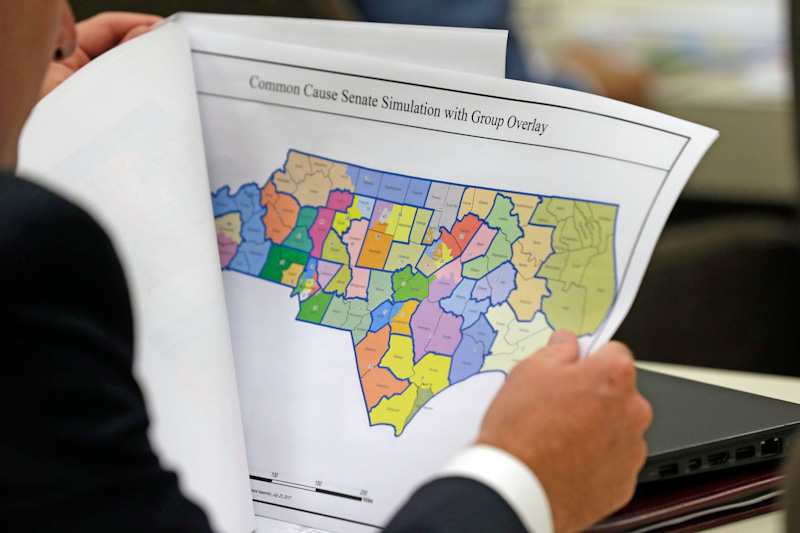Supreme Court rejects 'independent state legislature' theory, rules state courts may review congressional maps

A lawmaker studies a district map in July 2017 during a joint select committee meeting on redistricting in Raleigh, North Carolina. On Tuesday, the Supreme Court rejected the “independent state legislature” theory, which is based on the elections clause in Article I of the Constitution. Photo by Gerry Broome/The Associated Press.
The U.S. Supreme Court ruled 6-3 on Tuesday that state courts have the power to review congressional maps created by state legislatures.
The decision rejects the “independent state legislature” theory, which contended that state legislatures have the exclusive power to regulate congressional electionss—without review by state courts.
The independent state legislature theory is based on the elections clause in Article I of the Constitution. It provides that “the times, places and manner of holding elections for senators and representatives shall be prescribed in each state by the legislature thereof.”
The Supreme Court held that the elections clause does not give state legislatures the power to create congressional districts independently of state constitutional requirements.
The majority decision by Chief Justice Roberts cautioned, however, that “state courts do not have free rein” in their reviews.
“State courts may not transgress the ordinary bounds of judicial review such that they arrogate to themselves the power vested in state legislatures to regulate federal elections,” he wrote.
The Supreme Court ruled in a case involving North Carolina congressional maps backed by Republican state lawmakers. Roberts’ opinion was joined by Justices Sonia Sotomayor, Elena Kagan, Brett Kavanaugh, Amy Coney Barrett and Ketanji Brown Jackson.
Justices Clarence Thomas, Neil Gorsuch and Samuel Alito dissented.
Roberts addressed the dissenters’ arguments in his opinion.
“The legislative defendants and the dissent both contend that, because the federal Constitution gives state legislatures the power to regulate congressional elections, only that Constitution can restrain the exercise of that power,” Roberts wrote. “This argument simply ignores the precedent.”
The dissenters’ argument “also does not account for the framers’ understanding that when legislatures make laws, they are bound by the provisions of the very documents that give them life,” Roberts said. “Legislatures, the framers recognized, ‘are the mere creatures of the state constitutions and cannot be greater than their creators.’”
The Supreme Court agreed to hear the case after the North Carolina Supreme Court ruled in February 2022 that federal congressional and state legislative maps drawn by the GOP-controlled legislature were partisan gerrymanders that violate the state constitution.
But the state supreme court reversed its position in April and ruled that partisan gerrymanders by the legislature are nonjusticiable and can’t be considered by the courts. The North Carolina Supreme Court did not reinstate maps endorsed by the GOP lawmakers, however.
The Supreme Court said it could hear the case because of the continuing dispute.
The ABA applauded the decision, according to a June 27 statement by ABA President Deborah Enix-Ross.
The independent state legislature theory “would have given state lawmakers nearly unchecked power over federal elections,” Enix-Ross said. “The court held that the elections clause of the U.S. Constitution does not vest exclusive and independent authority in state legislatures to set the rules regarding federal elections.
“In October, the ABA filed an amicus brief with the court, expressing a ‘dire’ warning that a legal theory giving state legislatures unfettered authority to set rules for federal elections ‘would pose a severe threat to … democracy’ by freeing federal elections from the rule of law constraints that protect their integrity.
“The ABA believes in free and fair elections and in the importance of judicial review as a check and balance in our system of government. Both are cornerstones of our democracy.”
Several liberal groups issued statements praising the Supreme Court for rejecting the “fringe” and “radical” independent state legislature theory.
Despite that praise for the decision, Rick Hasen, a professor at the University of California at Los Angeles School of Law, said the Supreme Court adopted “a compromise position.”
The Supreme Court rejected the “maximalist” position advanced by North Carolina Republican lawmakers, Hasen wrote in a post at the Election Law Blog.
The legislators had argued that “state legislatures had a free-floating power to do whatever they wanted in federal elections, limited only by federal constitutional limits,” Hasen said.
But the Supreme Court held that the independent state legislature theory “gives the U.S. Supreme Court (and perhaps other federal courts) the ability to second guess determinations of a state court interpreting a state statute in a federal election,” Hasen said.
That means that the Supreme Court may have “the ultimate say over the meaning of state law in the midst of an election dispute,” Hasen wrote. “This is a bad, but not awful, result.”
The case is Moore v. Harper.
Hat tip to SCOTUSblog, which had early coverage of the decision.
See also:
ABAJournal.com: “Supreme Court ready to tackle free speech, affirmative action and election law in new term”
ABAJournal.com: “Chemerinsky: An important week of arguments in the Supreme Court”
ABAJournal.com: “Chemerinsky: Expect momentous decisions from the Supreme Court as term ends”
ABAJournal.com: “Chemerinsky: Supreme Court poised to sharply advance the law to the right”
Write a letter to the editor, share a story tip or update, or report an error.


